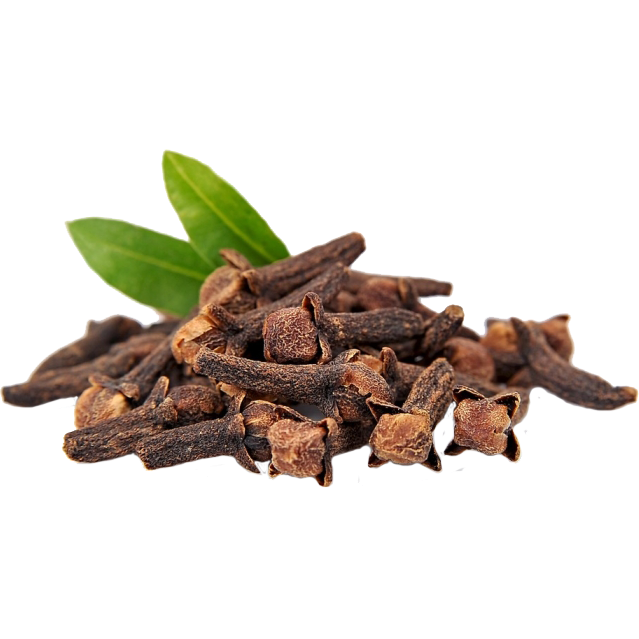Clove
Syzygium aromaticum L. – Myrtaceae

Clove (Syzigium aromaticum) is a natural spice with significant biological properties. It is primarily found in India and Indonesia, but can also be grown in other coastal areas. Clove is commonly used as a natural preservative and in the production of natural medicines. One of the significant benefits of clove is its ability to help treat diseases caused by various bacteria and fungi, including E. coli, P. aeruginosa, S. aureus, Z. mobilis, and C. albicans. In addition, clove possesses antioxidant properties that can help reduce cell damage caused by free radicals. Clove has also shown potential in inhibiting the growth of cancer cells and reducing the activities of enzymes such as amylase, glucosidase, and lipase, which may be useful in the treatment of diabetes. A study has shown that silver nanoparticles (AgNPs) synthesized from clove leaf extract exhibit promising antimicrobial, anticancer, antidiabetic, and antioxidant activities.
In summary, clove possesses diverse biological properties and has potential applications in various therapeutic areas. Clove volatiles can be obtained mainly by distillation of buds, twigs or leaves, resulting in different characteristics of the volatile oil.
Several factors such as cultivar, age and maturity of clove organs affect its yield and chemical composition. External factors, such as growing areas, post-harvest processes, distillation methods and storage conditions, also affect the quality of the volatile oil. The volatile oil extracted from cloves is currently used in the food, medical, cosmetic and pesticide industries.

Clove is widely known for its strong antioxidant properties, and has traditionally been used for dental care, as an aromatic spice and as a natural preservative. The leaves of the clove plant contain phytochemicals such as alkaloids, flavonoids and saponins. Clove essential oil is used in traditional Chinese medicine and has been found to have antiviral, antifungal, antibacterial, antiparasitic, analgesic, antioxidant, antimutagenic and antithrombotic effects. Antioxidants in cloves help reduce the spread of free radicals in the human body and protect cell membranes. It has been used to fight against microorganisms that cause diseases such as cholera, malaria and tuberculosis. The main ingredients of cloves are b-caryophyllene and eugenol acetate. Several studies have reported the fungicidal activity of clove oil against Candida.
Moreover, S. aromaticum extracts contain a diverse array of secondary metabolites, such as flavonoids, hydroxybenzoic acids, hydroxycinnamic acids, hydroxyphenylpropenes, eugenol, eugenol acetate, and gallic acid, with a wide range of beneficial health-promoting activities. These metabolites have active biological properties and unique aromatic structures and are safe for use in food and medicine. Clove metabolites are considered as new useful natural antimicrobial agents for the potential fight against drug-resistant Helicobacter pylori that produce cytotoxin genes, gastrointestinal disorders, anti-inflammatory, anti-thrombotic, anti-diabetic, anesthetic and possess insect repellent properties. In addition, cloves have been proven to have biological activity similar to insulin and regulate energy metabolism. This chapter provides insight into the effects of clove extracts on health promotion and their potential applications.
